Overview
The article's primary focus is to compassionately identify and explain the top foods to avoid for better management of ADHD symptoms. It highlights that foods rich in sugar, artificial additives, and processed ingredients can worsen ADHD symptoms. Research supports this, linking these dietary choices to increased hyperactivity and impulsivity in children. This underscores the importance of adhering to an ADHD: foods to avoid list to effectively manage symptoms. Understanding the challenges parents face in navigating these dietary choices is crucial, and this article aims to provide support and guidance for a healthier path forward.
Introduction
In the journey to understand Attention Deficit Hyperactivity Disorder (ADHD), one vital aspect that often goes unnoticed is the significant influence of diet on managing its symptoms. Recent research has unveiled a compelling link between our nutritional choices and behavioral outcomes, highlighting how what children consume can profoundly affect their attention spans and levels of impulsivity.
As parents and caregivers strive to find effective strategies to support children with ADHD, the necessity of a balanced diet rich in whole foods becomes increasingly evident. This article explores the intricate relationship between diet and ADHD, providing insights into:
- Foods to avoid
- Beneficial alternatives
- The potential for personalized dietary interventions to enhance overall well-being
Together, let’s discover how making mindful dietary choices can empower our children and support their journey toward better focus and emotional balance.
Understanding ADHD: The Impact of Diet on Symptoms
Attention Deficit Hyperactivity Disorder (ADHD) is a neurodevelopmental condition that many parents may find challenging to navigate. Characterized by inattention, hyperactivity, and impulsivity, ADHD can significantly impact a child's daily life. Recent research underscores the important role of diet in managing these behaviors, particularly through understanding the ADHD: foods to avoid list. It's crucial for parents and caregivers to recognize how certain foods can exacerbate or alleviate symptoms, as dietary choices can profoundly affect brain activity and behavior.
For example, diets high in sugar and processed foods are included in the ADHD: foods to avoid list, as they have been associated with increased hyperactivity and impulsivity in children. A meta-analysis of observational studies revealed that children with ADHD often have lower levels of essential nutrients, including significantly reduced 25(OH)D levels compared to their peers. This suggests that nutritional deficiencies may play a role in the severity of symptoms. On the other hand, balanced diets rich in whole foods—such as fruits, vegetables, and lean proteins—have shown promise in stabilizing mood and improving focus.
Furthermore, recent studies indicate that personalized nutrition strategies could benefit specific subgroups of children with ADHD. This highlights the potential for tailored nutritional interventions that align with the ADHD: foods to avoid list. Case studies have demonstrated that dietary changes can lead to improved nutritional intake, which may positively influence ADHD symptoms.
This reinforces the significance of maintaining a well-rounded diet for effective management of ADHD.
As we continue to learn more about how diet affects attention disorders, it’s vital for parents and caregivers to stay informed about the impact of their dietary choices on their children's behavior and overall well-being. By making informed decisions about nutrition, they can play a pivotal role in supporting their children's development and addressing attention-related challenges. As Rania Nabil Sabry aptly notes, "The authors declare that they have no competing interests," emphasizing the integrity of the research in this important area.
Top 10 Foods to Avoid for Better ADHD Management
- Sugar: Excessive sugar consumption can lead to energy spikes followed by crashes, which may worsen symptoms of attention deficit hyperactivity disorder (ADHD). Research indicates that early consumption of sugar-sweetened beverages is linked to a higher risk of developing ADHD later in life. A study published in 2022 in Progress in Neuro-Psychopharmacology and Biological Psychiatry highlights the importance of dietary interventions for adults with ADHD. By transitioning to an ADHD-protective diet and reducing sugar, individuals may significantly improve their management of the condition, particularly when adhering to the ADHD: foods to avoid list. L. Anselmi noted that sucrose consumption was linked to the prevalence of ADHD among boys at 6 years of age, emphasizing the need for careful monitoring of sugar intake.
- Artificial Additives: Ingredients such as artificial colors and flavors, notably Red 40, have been associated with increased hyperactivity in children. Eliminating these additives from the diet can help mitigate behavioral issues. Consider discussing these changes with your child to see how they feel about it.
- Processed Foods: Foods high in preservatives and low in nutritional value can negatively impact behavior and focus. For better management of ADHD indicators, it is recommended to follow a diet abundant in whole foods, as outlined in the ADHD: foods to avoid list. The case study titled 'Transitioning to an ADHD-Protective Diet' illustrates that adopting a healthier diet, including the ADHD: foods to avoid list, can help manage ADHD manifestations more effectively.
- Caffeine: Commonly found in sodas and energy drinks, caffeine can disrupt sleep patterns and heighten anxiety. It is essential to limit its intake for those with ADHD to promote better overall well-being.
- Dairy Products: Some individuals may have sensitivities to dairy, which can exacerbate ADHD effects. Monitoring dairy consumption and considering alternatives may be beneficial, especially when referring to the ADHD: foods to avoid list. This list indicates that gluten can trigger inflammatory responses that negatively affect behavior. A gluten-free diet may help enhance focus and lessen issues in sensitive individuals, aligning with the ADHD: foods to avoid list.
- Soy: Soy products can be problematic for those with sensitivities, potentially leading to increased hyperactivity. It is advisable to monitor any negative responses to soy and refer to the ADHD: foods to avoid list to modify the diet accordingly.
- Corn Syrup: This common sweetener can lead to blood sugar elevations followed by drops, which may exacerbate attention-related issues. Reducing corn syrup intake can contribute to more stable energy levels. It's important to consider the ADHD: foods to avoid list, which highlights fried foods high in unhealthy fats that can impair cognitive function and overall health. Opting for healthier cooking methods can support better mental clarity and focus. Additionally, the ADHD: foods to avoid list includes high-fat dairy products like cream and butter that may contribute to inflammation and should be limited in the diet. Selecting low-fat or non-dairy options might assist in managing ADHD indicators according to the ADHD: foods to avoid list.
The Role of Food Additives and Preservatives in ADHD
Studies have shown that food additives and preservatives, such as sodium benzoate and artificial colors, are linked to the worsening of attention deficit hyperactivity disorder (ADHD) characteristics. This connection is why these substances are included in the ADHD: foods to avoid list. Research indicates that these additives can significantly increase hyperactivity and impulsivity in affected individuals. A meta-analysis titled 'Meta-Analysis of Food Color Additives and ADHD' revealed a statistically significant effect of food color additives on ADHD manifestations, with an effect size of d = 0.27. This finding highlights the need for further investigation into specific additives and their impacts.
This analysis utilized rigorous methodologies, including double-blind, placebo-controlled designs, to assess the relationship. For instance, children consuming diets high in artificial additives exhibited more pronounced ADHD symptoms compared to those following a diet free from these chemicals. This correlation underscores the importance of dietary choices—like those in the ADHD: foods to avoid list—in managing ADHD behaviors.
Experts, including Dr. Tracy Edinger from Oregon Health and Science University, recommend that parents refer to the ADHD: foods to avoid list by meticulously reading product labels and prioritizing whole, unprocessed items to reduce exposure to potentially harmful additives. In light of rising concerns about childhood obesity and the implications of additives, minimizing exposure to artificial colorings and preservatives is advisable until their long-term safety can be better established.
By making informed dietary choices, parents can play a crucial role in supporting their children's behavioral health and overall well-being. Have you considered how dietary changes might impact your child's behavior? Sharing your experiences can help build a supportive community for others navigating similar challenges.
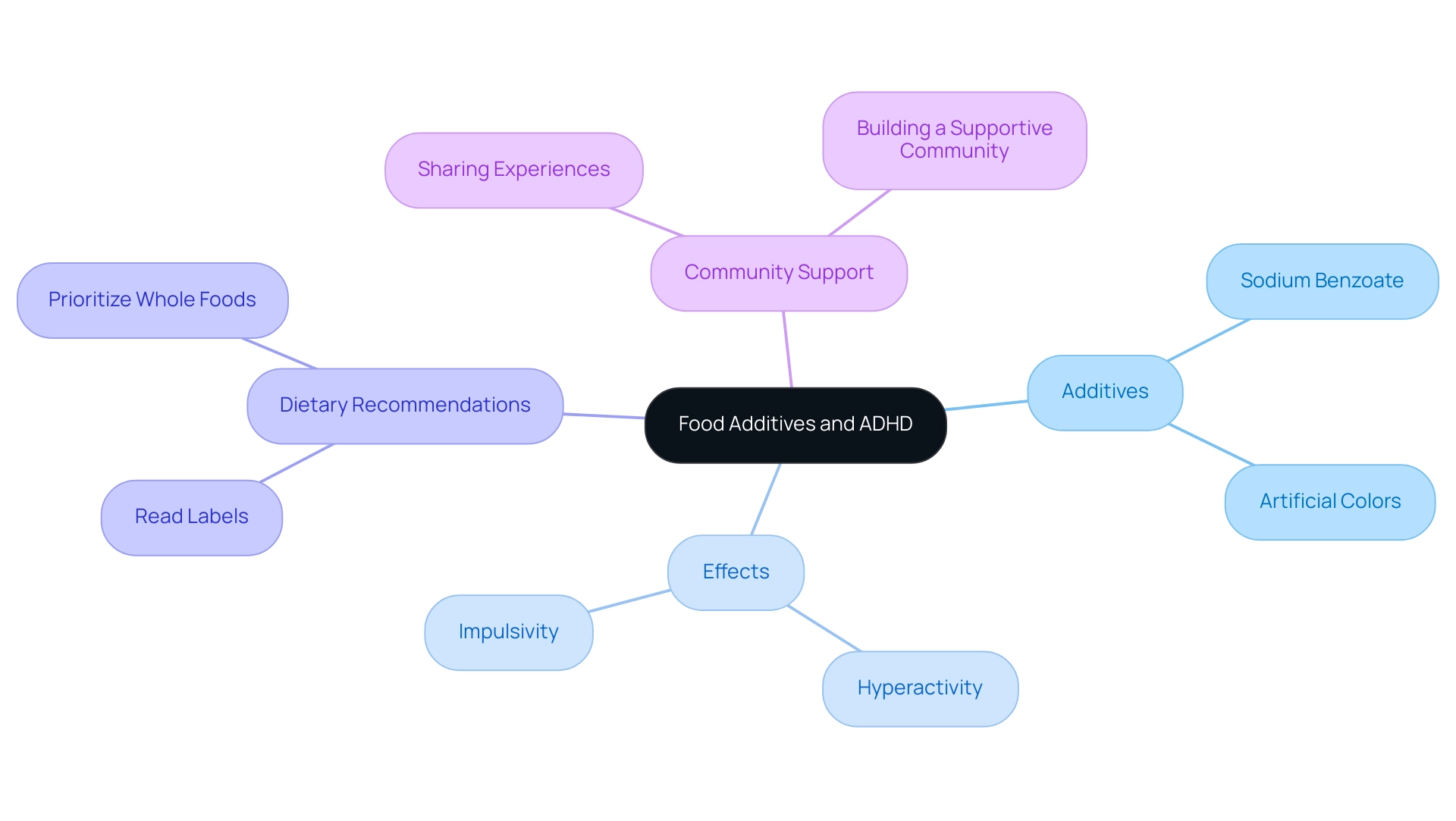
Identifying Food Sensitivities: A Key to Managing ADHD
Recognizing food sensitivities is crucial for effectively managing attention deficit hyperactivity disorder (ADHD), particularly when it comes to understanding the ADHD: foods to avoid list. Research indicates that many children with ADHD may exhibit sensitivities to common allergens, such as dairy, gluten, and nuts. These sensitivities can manifest as heightened hyperactivity, irritability, and challenges with concentration, underscoring the importance of the ADHD: foods to avoid list.
A study on the role of nutrition in ADHD management highlights the historical context of dietary influences on ADHD symptoms. This underscores the significance of individualized dietary approaches tailored to each child’s needs.
Parents can collaborate with healthcare professionals to implement elimination diets. This method involves removing suspected trigger items from the diet for a designated period. Following this, these items are gradually reintroduced to monitor any behavioral changes. This organized approach not only helps in identifying specific items that may exacerbate ADHD symptoms but also aligns with findings that nutritional interventions can significantly reduce these signs.
Statistics reveal that for a notable 37.5% of children studied, symptoms worsened when consuming grains. This underscores the importance of maintaining an ADHD: foods to avoid list for careful dietary management. As Buyun Liu, MD, PhD, observes, "Although the specific mechanisms connecting dietary allergies and other allergic conditions to ADHD remain to be comprehended, physicians should be aware of the heightened risk of ADHD as a comorbidity in children with allergic conditions." Specialist viewpoints emphasize the significance of identifying dietary sensitivities in children with ADHD, promoting customized nutritional advice as a viable treatment option.
By understanding and addressing these sensitivities, parents can take proactive steps toward improving their child's overall well-being and behavior. Together, let’s navigate this journey for a brighter future.
Healthy Alternatives: Foods to Include in an ADHD Diet
-
Fruits and Vegetables: These delightful foods are foundational to a healthy diet, brimming with essential vitamins and minerals. A colorful variety not only makes meals visually appealing but also ensures a broad spectrum of nutrients. Research indicates that increasing the intake of fruits and vegetables can enhance focus in children with attention deficits, highlighting their vital role in managing challenges. A case study titled 'Association of Diet Quality with Attention Deficit Hyperactivity Disorder and Emotional Dysregulation Indicators' revealed that children consuming fewer fruits and vegetables often exhibited more severe signs of inattention, underscoring the importance of incorporating these nutritious items into their diets.
-
Whole Grains: Embracing whole grains such as brown rice, quinoa, and whole grain bread is essential for providing the necessary fiber. These foods help maintain stable blood sugar levels, which can be particularly beneficial for individuals with attention deficit hyperactivity disorder. Following the ADHD: foods to avoid list is crucial to prevent blood sugar fluctuations that may exacerbate symptoms. Moreover, daily doses of zinc supplementation, ranging from 10 to 40 mg, have been shown to support overall health, which may indirectly aid in managing attention deficit hyperactivity disorder.
-
Lean Proteins: Incorporating lean proteins like chicken, turkey, fish, and legumes into meals supports brain health. These foods can help stabilize mood and enhance focus, making them a vital component of an ADHD-friendly diet.
-
Healthy Fats: Omega-3 fatty acids, found in sources like salmon, walnuts, and flaxseeds, are renowned for their role in supporting cognitive function. Research suggests that these nutritious fats may contribute to improved emotional regulation and overall brain health, positioning them as an essential element in dietary approaches for managing attention challenges.
-
Nuts and Seeds: These nutrient-dense snacks provide a wonderful combination of healthy fats and protein, helping to maintain steady energy levels throughout the day. Including a variety of nuts and seeds in the diet can offer additional benefits, such as improved concentration and reduced impulsivity. As L. Eugene Arnold, MD, emphasizes, a balanced diet can significantly influence the management of attention-related challenges, making it essential to focus on nutritious food options and consult the ADHD: foods to avoid list to steer clear of items that may worsen the condition.
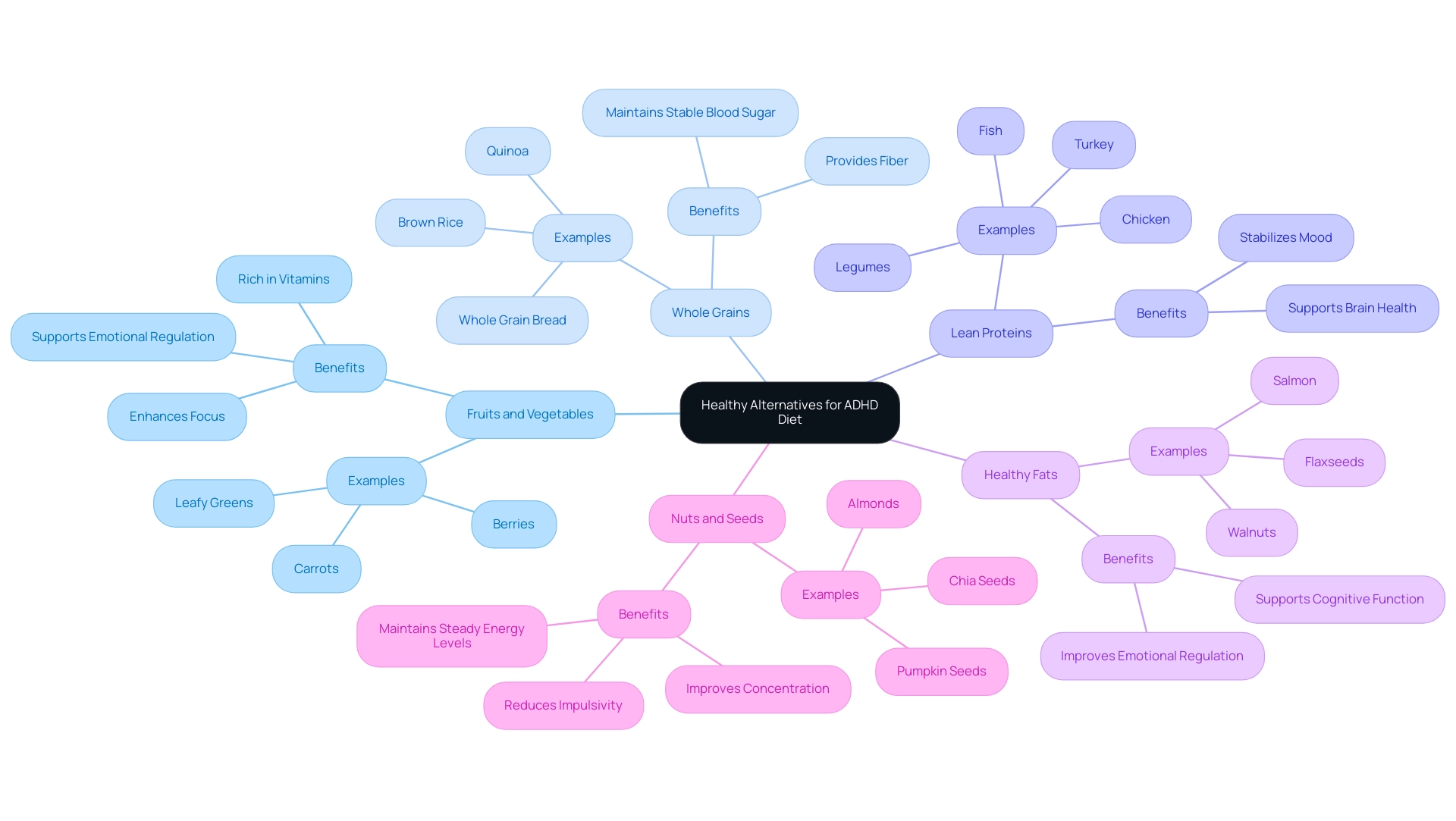
Hydration and ADHD: Why Water Matters
Hydration plays a vital yet often underestimated role in managing attention deficit hyperactivity disorder (ADHD) symptoms. It's important to understand that dehydration can significantly impair cognitive functions, leading to challenges in attention and memory. Children with ADHD are particularly susceptible to dehydration, often due to hyperfocus or forgetfulness about their water intake.
In fact, studies reveal that a staggering 75% of participants experienced dehydration throughout the day, underscoring the importance of consistent hydration.
To support optimal cognitive function, parents should encourage their children to drink at least 6-8 glasses of water daily. Simple strategies can make a substantial difference:
- Keeping a water bottle readily available
- Setting reminders for water breaks
- Incorporating water-rich foods such as fruits and vegetables into meals
can all help ensure adequate hydration.
Moreover, expert opinions emphasize the significance of hydration in managing ADHD. Pediatricians stress that adequate hydration is crucial for sustaining concentration and alleviating challenges. Julia K. Riddell notes, "Exposure to elevated levels of fluoride in tap water is linked to a greater risk of ADHD indicators and diagnosis among Canadian youth, especially among teenagers."
This highlights the importance of not only hydration but also the quality of water consumed.
A case study titled "Association of Water Fluoride and Attention Deficit Hyperactivity Disorder in Canadian Youth" examined the relationship between fluoride exposure from tap water and the prevalence of ADHD among Canadian youth. The results suggested that elevated concentrations of fluoride in tap water were linked to higher chances of an ADHD diagnosis and additional attention-related behaviors, particularly in teenagers. This implies that ensuring access to clean, fluoridated water could be beneficial, as natural water fluoridation has been associated with a reduced prevalence of attention disorders.
By prioritizing hydration and considering the quality of water, parents can play an essential role in enhancing their child's overall well-being and ability to effectively cope with attention challenges.
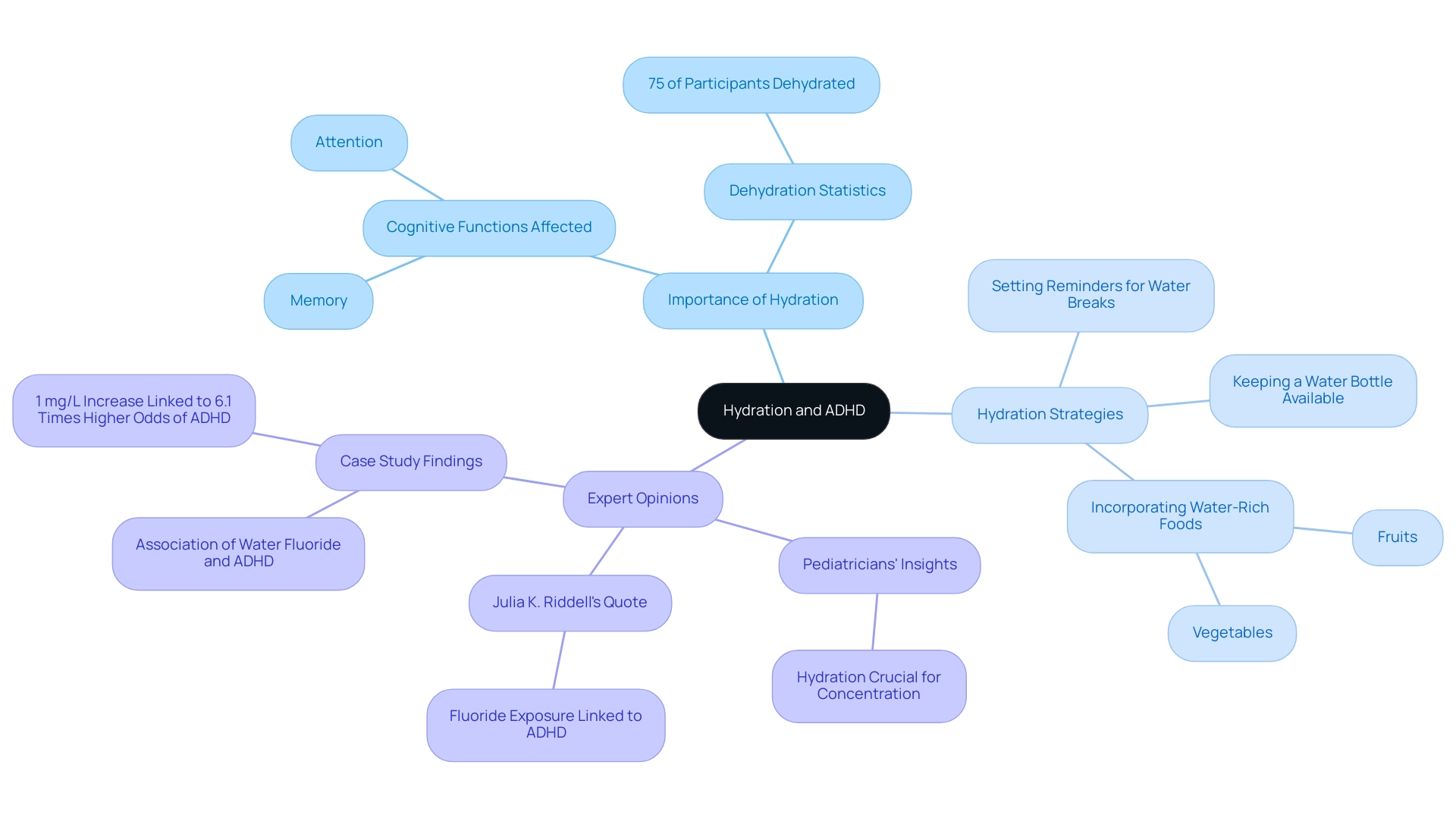
The Benefits of Dietary Changes for ADHD Management
Making changes to one’s nutrition can lead to remarkable improvements in managing ADHD symptoms. Many parents who have embraced specific nutritional adjustments share heartening stories of noticeable enhancements in their children's focus, reduced impulsivity, and improved mood. Research supports these observations, revealing that children who follow a balanced diet rich in whole foods often experience fewer behavioral challenges.
For example, a study by Carucci et al. (2022) involving 160 children found that those who received nutritional supplements containing 279 mg EPA, 87 mg DHA, and 30 mg GLA daily for six months showed significant improvements in attention deficit hyperactivity disorder symptoms. This highlights the potential effectiveness of personalized dietary approaches in ADHD management.
Moreover, families have shared inspiring success stories about how nutrition has transformed their daily lives. By prioritizing nutritious options and utilizing the ADHD foods to avoid list, they have cultivated supportive environments that foster better attention and emotional regulation. A notable case study by Dölp et al. focused on the oligoantigenic diet, which removes individually allergenic food items. In this research, four out of eight children exhibited significant improvement in ADHD symptoms after dietary changes, although further randomized controlled trials are necessary to confirm these findings.
As our understanding of the connection between diet and ADHD continues to deepen, the call for larger, randomized controlled trials remains essential. P.M. emphasizes that 'more robust scientific evidence is required for these nutritional interventions to be implemented as part of attention disorder treatment.' Such insights can empower parents and professionals alike to make informed dietary choices that enhance the well-being of children with attention-deficit hyperactivity disorder. Together, we can nurture a supportive path forward for our children.
Summary: Key Takeaways for Managing ADHD Through Diet
Managing ADHD through diet can feel overwhelming, but understanding a few key principles can make a significant difference. Here are some essential takeaways that may help you and your child navigate this journey with compassion and care.
- Avoid High-Sugar and Processed Foods: It’s important to steer clear of foods high in sugar and artificial additives, as they can worsen ADHD symptoms. Research suggests that these ingredients might lead to increased hyperactivity and impulsivity in children with attention deficit hyperactivity disorder. Following an ADHD: foods to avoid list can be a vital step in making thoughtful dietary choices. Studies have shown a link between high sugar intake and worsened ADHD symptoms, underscoring the importance of being mindful about what your child eats.
- Identify Dietary Sensitivities: Observing your child’s reactions to different foods can be incredibly enlightening. Elimination diets may help in recognizing and removing potential dietary sensitivities, leading to significant improvements in behavior and cognitive function.
- Incorporate Nutrient-Dense Foods: A balanced diet filled with fruits, vegetables, whole grains, lean proteins, and healthy fats is crucial. These foods provide essential nutrients that support brain health and overall well-being, contributing positively to your child's development.
- Stay Hydrated: Don’t underestimate the power of hydration. Adequate fluid intake is vital for cognitive function, as dehydration can negatively impact concentration and mood. Encourage your child to drink water regularly throughout the day.
- Recognize the Impact of Nutritional Changes: Many parents report that dietary adjustments lead to noticeable improvements in behavior and emotional regulation. For example, a pilot double-blind randomized placebo-controlled trial examined the effects of Lactobacillus rhamnosus GG on ADHD symptoms in 32 drug-naive children and adolescents aged 4–17 years, showing promising results in symptom reduction. This highlights the potential benefits of dietary interventions.
- Expert Insights: Nutritionists emphasize the significance of a well-rounded diet in managing ADHD. They advocate for a focus on whole ingredients and caution against relying on supplements that lack robust clinical evidence. As Dr. Michael H. Bloch from the Child Study Center at Yale University School of Medicine notes, "Rigorous, randomized, placebo-controlled clinical trials examining the efficacy of nutritional supplements in the treatment of ADHD are needed."
- Real-World Examples: Many families have found success by prioritizing whole foods and minimizing processed snacks in their meal planning. Parents often observe remarkable improvements in their children's focus and behavior when these nutritional changes are implemented.
- Address Sleep Issues: Sleep plays a significant role in managing ADHD. A case study on melatonin for sleep problems in children with ADHD found that melatonin effectively reduced sleep-onset latency. When combined with nutritional management, this can further support behavioral improvements.
By following these guidelines, you can create a nurturing nutritional environment that may enhance the management of ADHD symptoms. Remember to consider the ADHD: foods to avoid list as you make dietary choices for your child. Together, we can foster a supportive atmosphere that promotes well-being and growth.
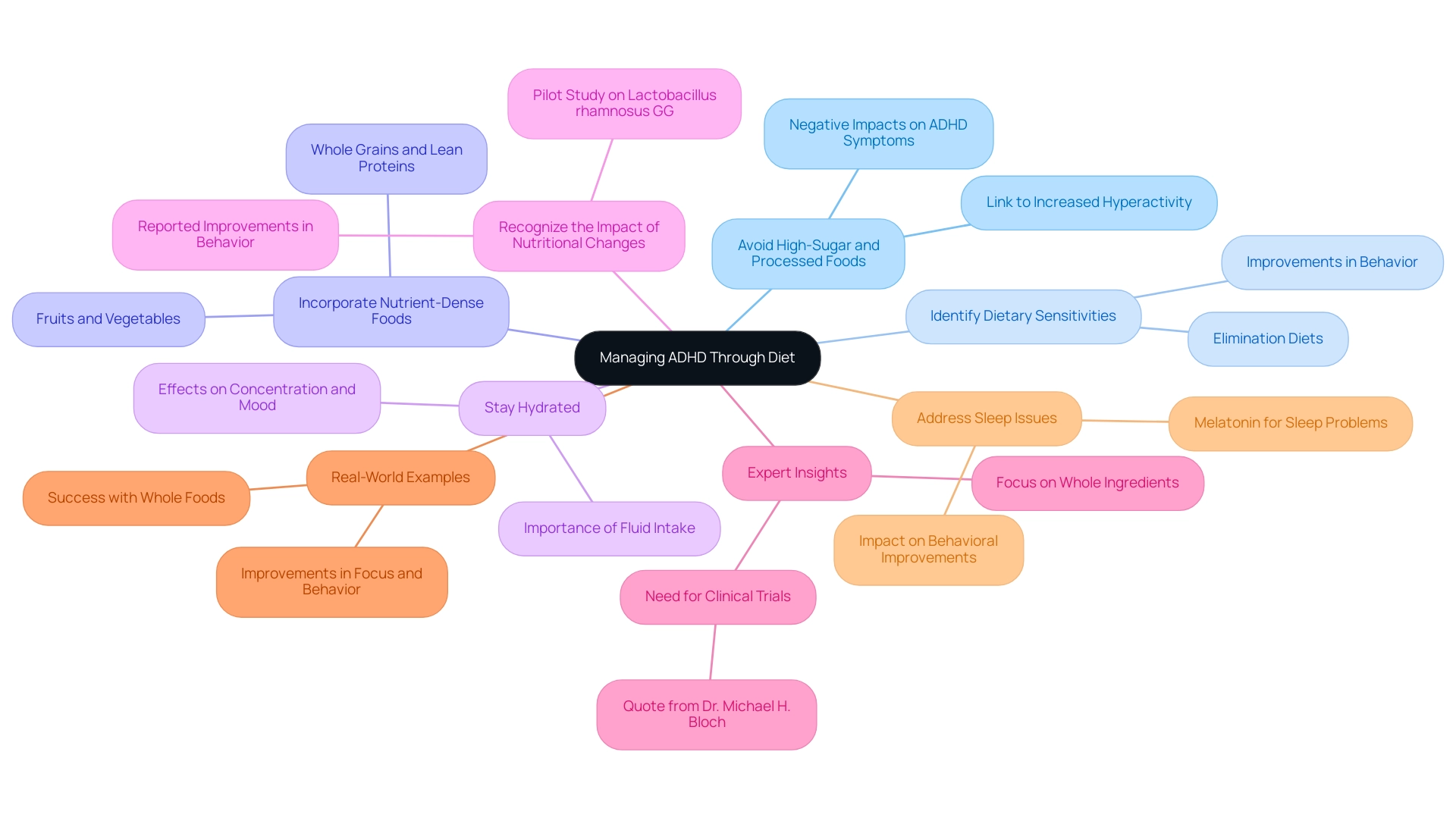
Consulting with Professionals: The Importance of Guidance in Dietary Changes
Engaging with healthcare experts, particularly licensed dietitians and nutritionists, is crucial when considering significant nutritional changes, especially regarding the ADHD: foods to avoid list for effective management. These specialists offer tailored advice that aligns with individual needs, ensuring that any dietary modifications are not only safe but also effective. They are vital in identifying potential food sensitivities and recommending an ADHD: foods to avoid list alongside suitable alternatives that can enhance overall health.
For instance, a study examining a restricted foods regimen highlighted the importance of the ADHD: foods to avoid list, revealing clinically significant improvements in attention deficit hyperactivity disorder and oppositional defiant disorder among children. This underscores the potential impact of nutritional interventions. Additionally, a randomized placebo-controlled study evaluated the effects of omega-3 and omega-6 fatty acid supplementation, indicating moderate benefits on inattention symptoms, further emphasizing the relevance of nutritional considerations in managing attention deficit hyperactivity disorder. The insights shared by registered dietitians reinforce the need for personalized nutritional guidance, which can aid in creating an ADHD: foods to avoid list.
As Andrea Holwegner, a registered nutritionist, noted, understanding individual nutritional needs can help avert negative emotional states tied to hunger, which may worsen symptoms of attention deficit hyperactivity disorder, thus underlining the significance of the ADHD: foods to avoid list.
Collaborating with these experts empowers families to make informed food choices while effectively utilizing the ADHD: foods to avoid list, fostering lasting improvements that positively influence their child's health and behavior. By consulting with dietitians, families can navigate the complexities of attention deficit hyperactivity disorder management more adeptly, especially by referencing the ADHD: foods to avoid list to ensure their nutritional strategies are rooted in expert knowledge and tailored to their unique situations. Moreover, recent studies, including a meta-analysis on zinc deficiency, highlight the intricate role of nutritional factors in managing attention deficit hyperactivity disorder, reinforcing the necessity of professional guidance.
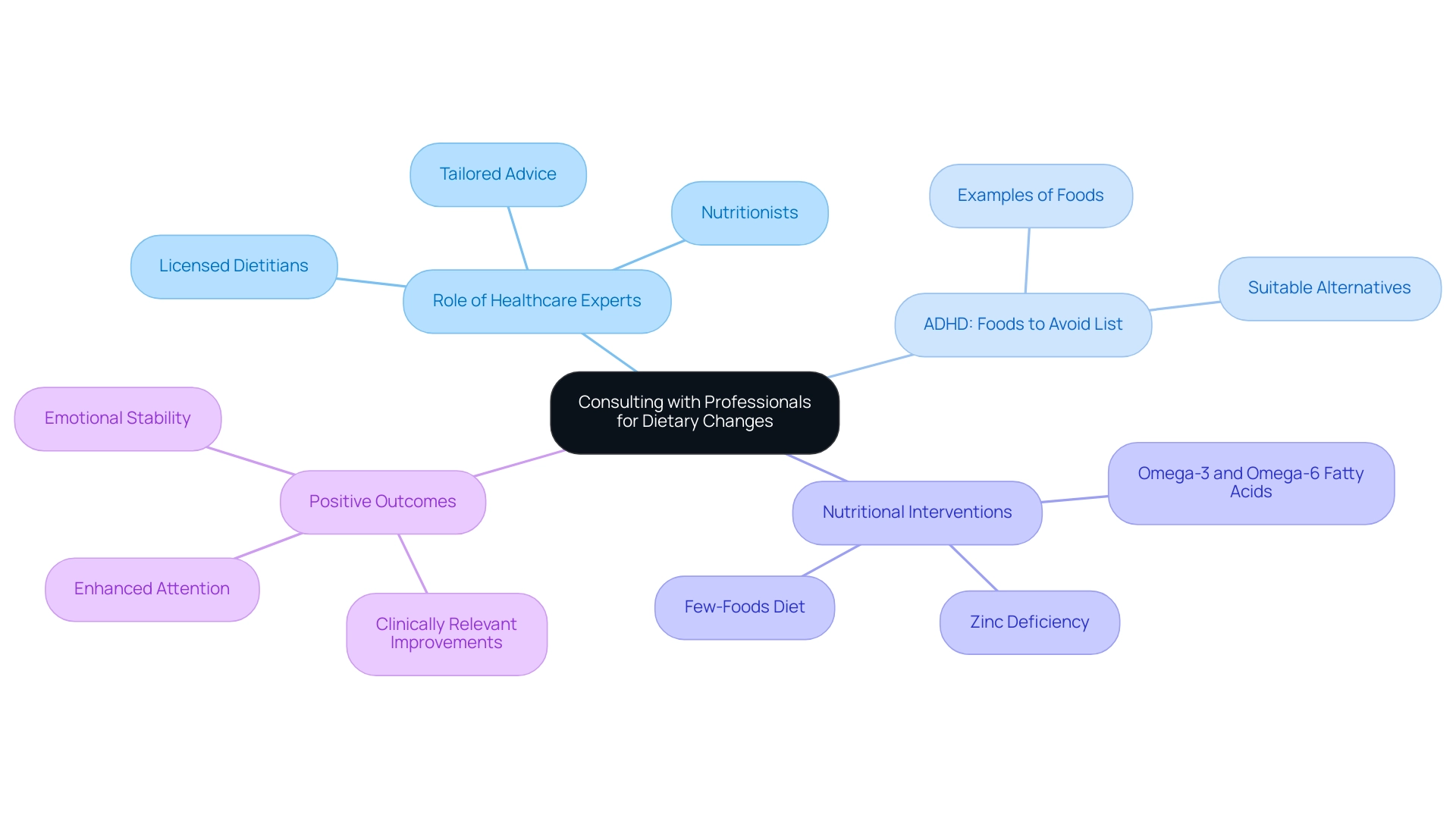
Further Resources: Support for Parents and Individuals with ADHD
For parents and individuals seeking to manage ADHD through dietary choices, a wealth of resources is available to provide support and guidance.
- CHADD (Children and Adults with Attention-Deficit/Hyperactivity Disorder) offers a rich array of educational materials and facilitates support groups, helping families navigate the complexities of ADHD.
- ADDitude Magazine stands out as a prominent resource, providing informative articles, professional guidance, and community discussions that emphasize effective management strategies for attention challenges, including nutritional factors.
- Participating in local support groups for attention deficit hyperactivity disorder can cultivate meaningful peer relationships, enabling families to exchange experiences and methods for nutritional management.
- Additionally, consulting with registered dietitians who specialize in ADHD can yield personalized meal plans tailored to individual needs, ultimately enhancing the overall management of symptoms.
In 2022, the CDC reported, "In 2022, an additional 1 million U.S. children aged 3-17 years had ever received a diagnosis of attention-deficit/hyperactivity disorder compared to 2016." This statistic underscores the growing need for effective management strategies, including dietary interventions. Research indicates that children with attention deficit hyperactivity disorder often exhibit fewer healthy lifestyle behaviors than their typically developing peers, highlighting the significance of the ADHD: foods to avoid list for nutritional support.
Furthermore, a meta-analysis has shown a significant association between lower vitamin D levels and an increased likelihood of attention deficit hyperactivity disorder, suggesting that nutritional considerations are crucial in prevention strategies. This is further supported by a case study titled 'Vitamin D and Risk of Attention Deficit Hyperactivity Disorder,' which emphasizes the importance of adequate vitamin D levels in potentially reducing the risk of this condition. A summary table includes various studies on nutritional supplements and their impacts on attention deficit hyperactivity disorder symptoms, offering additional insights into nutritional considerations.
By leveraging these valuable resources, parents can better navigate the dietary aspects of ADHD management, including the ADHD: foods to avoid list, ultimately improving outcomes for their children.
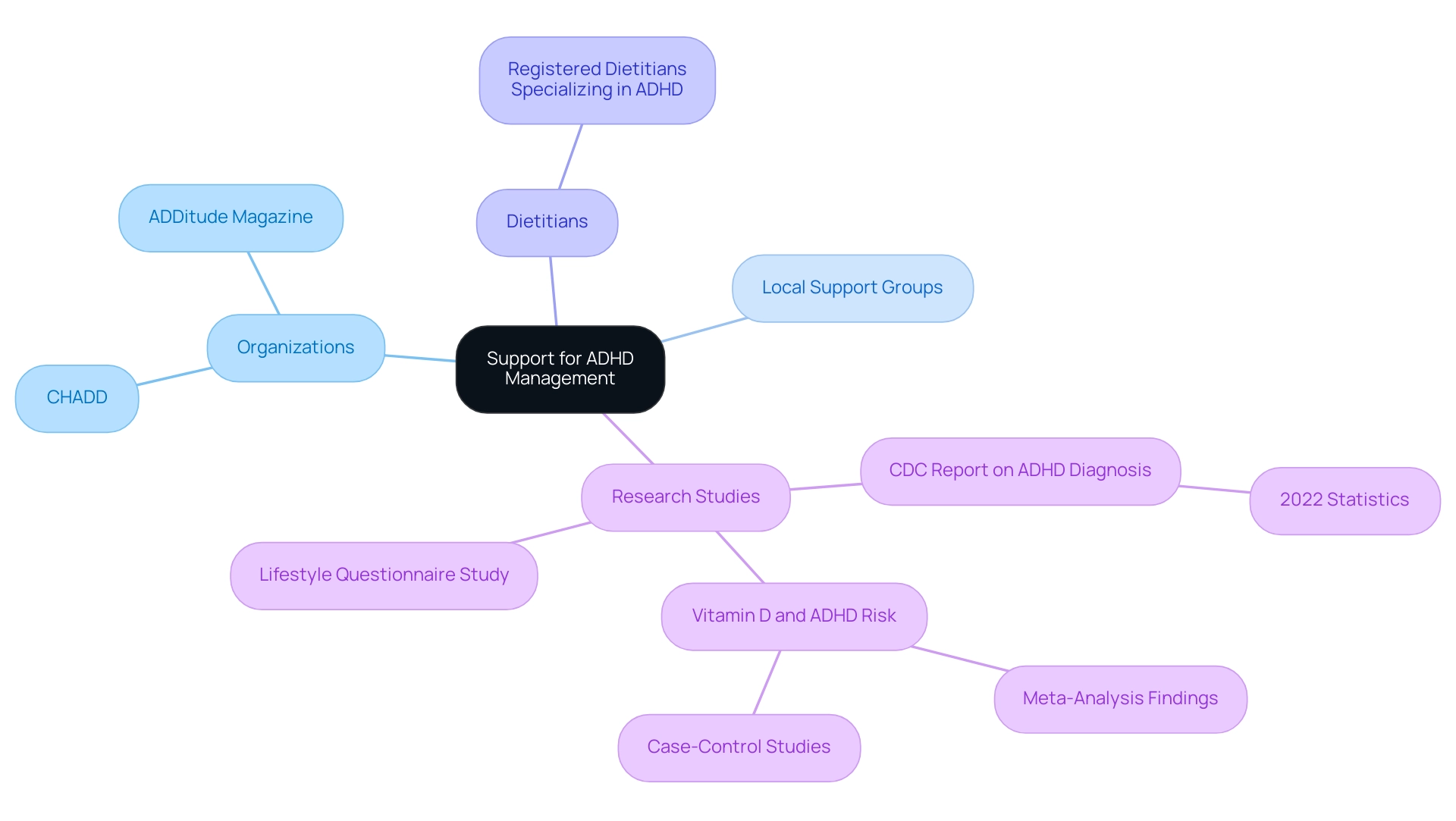
Conclusion
Making mindful dietary choices can truly transform the way we manage ADHD symptoms. This article has explored the intricate connections between diet and ADHD, highlighting how crucial it is to steer clear of high-sugar and processed foods that may worsen hyperactivity and impulsivity. By identifying food sensitivities through elimination diets, caregivers can tailor dietary strategies that lead to meaningful improvements in behavior and cognitive function.
Incorporating nutrient-dense foods—think fruits, vegetables, whole grains, lean proteins, and healthy fats—nurtures brain health and emotional regulation. Staying adequately hydrated is equally vital; dehydration can hinder cognitive functions and intensify ADHD symptoms. The evidence presented underscores the potential for dietary changes to enhance focus, reduce impulsivity, and improve overall well-being.
Engaging with healthcare professionals, especially registered dietitians, can provide invaluable guidance in navigating dietary modifications. These experts can help identify individual needs, ensuring that dietary interventions are both effective and safe. By leveraging expert insights and resources, parents can create a nurturing dietary environment that empowers their children to manage ADHD symptoms more effectively.
Ultimately, the journey toward better focus and emotional balance for children with ADHD begins with informed dietary choices. By understanding the significant impact of nutrition on behavior and cognition, families can take proactive steps to foster healthier lifestyles that contribute to improved outcomes in ADHD management. Together, let’s empower our children to thrive through the choices we make.
Frequently Asked Questions
What is Attention Deficit Hyperactivity Disorder (ADHD)?
ADHD is a neurodevelopmental condition characterized by inattention, hyperactivity, and impulsivity, which can significantly impact a child's daily life.
How does diet affect ADHD symptoms?
Diet plays a crucial role in managing ADHD symptoms. Certain foods can exacerbate or alleviate behaviors associated with ADHD, affecting brain activity and behavior.
What types of foods should be avoided for managing ADHD?
Foods to avoid include those high in sugar, processed foods, artificial additives, caffeine, dairy products, soy, and corn syrup, as they can worsen hyperactivity and impulsivity.
Why is sugar consumption a concern for children with ADHD?
Excessive sugar can lead to energy spikes followed by crashes, worsening ADHD symptoms. Early consumption of sugar-sweetened beverages is linked to a higher risk of developing ADHD.
What role do artificial additives play in ADHD?
Artificial additives, such as colors and flavors, have been associated with increased hyperactivity in children. Eliminating these from the diet can help mitigate behavioral issues.
How can processed foods impact children with ADHD?
Processed foods that are high in preservatives and low in nutritional value can negatively affect behavior and focus. A diet rich in whole foods is recommended for better management of ADHD symptoms.
What dietary changes have shown promise in managing ADHD?
Balanced diets rich in whole foods, such as fruits, vegetables, and lean proteins, have shown promise in stabilizing mood and improving focus. Personalized nutrition strategies may also benefit specific subgroups of children with ADHD.
How can caffeine affect children with ADHD?
Caffeine can disrupt sleep patterns and heighten anxiety, so it is essential to limit its intake for those with ADHD to promote better overall well-being.
Are there specific sensitivities related to dairy and soy for children with ADHD?
Some individuals may have sensitivities to dairy and soy, which can exacerbate ADHD symptoms. Monitoring these foods and considering alternatives may be beneficial.
What is the significance of the ADHD: foods to avoid list?
The ADHD: foods to avoid list highlights dietary choices that can influence ADHD symptoms. By following this list, parents can make informed decisions that support their children's behavioral health and overall well-being.




